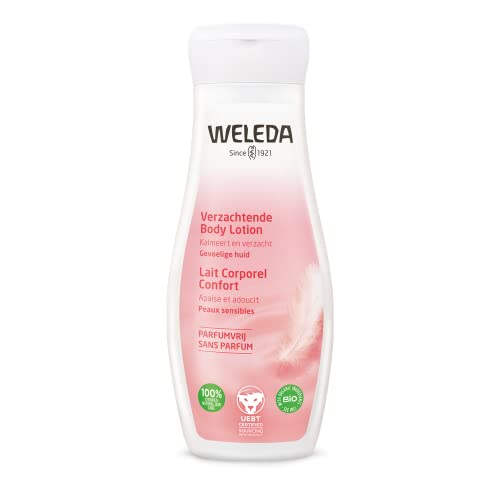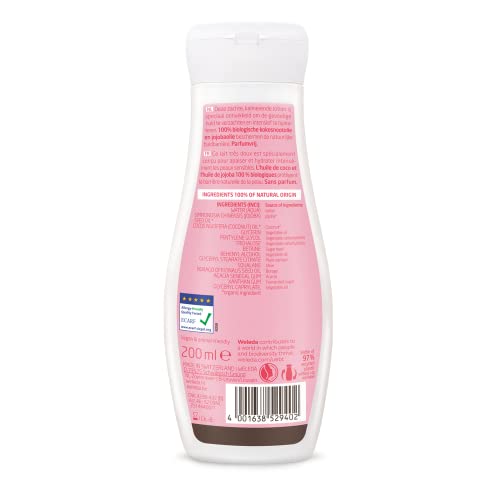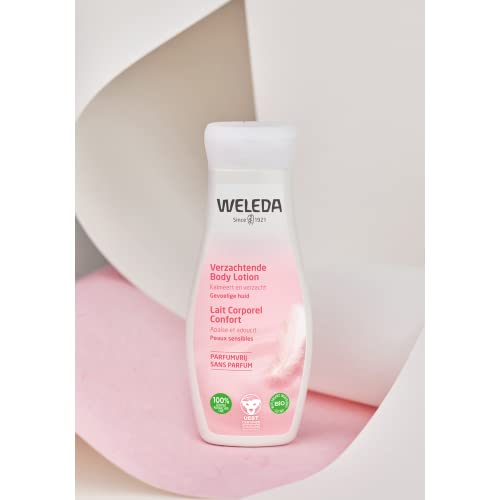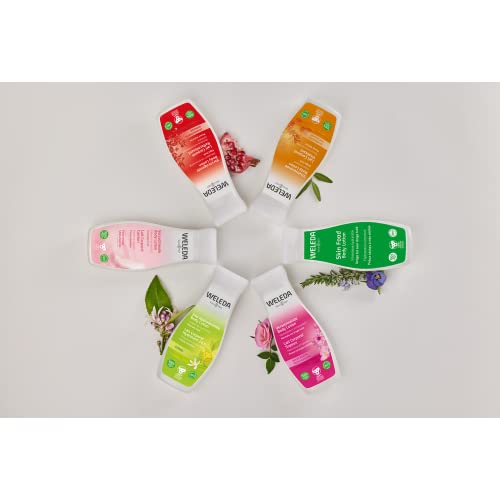



Weleda Body Lotion - Hydrating, Paraben & Phthalate-Free, Cruelty-Free - 6.8 fl oz


Acacia Senegal Gum
Medium RiskAcacia senegal gum is derived from the dried sap of the Acacia senegal tree, primarily used as a thickening agent, emulsifier, and stabilizer in food and cosmetic products. It is recognized for its gelling properties and is often utilized in formulations to improve texture and consistency.
Sustai Insights
Acacia senegal gum offers functional benefits such as emulsification and stabilization in products, and it is biodegradable, which contributes positively to sustainability. Health risks are generally low, with moderate concerns related to allergies. Environmental risks are minimal, although the ingredient is subject to regulatory oversight, including usage restrictions. Overall, the risk level is assessed as medium, and the ingredient should be used according to safety recommendations. Alternatives include other natural gums like guar gum or xanthan gum for similar stabilizing effects.
Betaine
Medium RiskBetaine is a zwitterion (inner salt) commonly used in personal care and cosmetic products. It functions primarily as a humectant, aiding in moisture retention, and can also act as a surfactant, contributing to the cleansing properties of formulations.
Sustai Insights
Betaine is recognized for its effective moisturizing and surfactant properties, making it beneficial in enhancing product performance. It is generally considered low risk for health concerns such as carcinogenicity, allergies, and reproductive toxicity. However, there are multiple additive exposure sources to consider. Environmentally, it poses low risks regarding pollution and bioaccumulation. Regulatory status indicates it is approved for use with no significant restrictions. Overall, it presents a medium risk level, and safe usage practices should be observed. Alternatives include glycerin or sorbitol for similar benefits.
Glycerin
Medium RiskGlycerin (also called glycerol) is a naturally occurring compound commonly used in personal care and cosmetic products. It functions as a humectant, attracting moisture to the skin, and is also utilized as a solvent and emollient to enhance product texture and stability.
Sustai Insights
Glycerin is valued for its effective moisturizing properties and biodegradability, making it a widely accepted ingredient in formulations. It poses low health risks, including low concerns for carcinogenicity and allergies. However, moderate use restrictions exist due to regulatory guidelines. While glycerin does not significantly contribute to environmental pollution, its production process should be ethically sourced. Overall, glycerin holds a medium risk level, emphasizing the importance of safe usage practices and considering sustainable alternatives.
Squalane
Low RiskSqualane is a naturally occurring lipid found in both plants and animals, primarily derived from olives and sugarcane in cosmetic formulations. It functions as a moisturizer and emollient, aiding in skin hydration and maintaining the skin barrier.
Sustai Insights
Squalane offers functional benefits as an effective moisturizing agent, enhancing skin hydration without clogging pores. It is sustainably sourced, often derived from renewable plant materials. Health risks are minimal, with low concerns regarding carcinogenicity, allergies, and endocrine disruption. Environmental impacts are also low, as squalane is biodegradable. Regulatory bodies have not placed significant restrictions on its use, confirming its safety profile. Overall, squalane is assessed as low risk, making it a favorable ingredient in cosmetic products.
Glyceryl Caprylate
Low RiskGlyceryl caprylate is a monoester of glycerin and caprylic acid, commonly used in cosmetics and personal care products as an emulsifier and skin-conditioning agent. It helps stabilize formulations and improve the texture and feel on the skin.
Sustai Insights
Glyceryl caprylate offers functional benefits as an effective emulsifier and skin-conditioning agent, enhancing product performance. It is biodegradable and considered sustainably sourced. Health risks are low, with minimal concerns regarding carcinogenicity, allergenic potential, and endocrine disruption. Environmental risks are also low, with no significant pollutant or bioaccumulation potential identified. Regulatory status is favorable, with no major restrictions. Overall, glyceryl caprylate maintains a low risk profile, making it a suitable ingredient for use in cosmetic formulations.
Trehalose
Low RiskTrehalose is a disaccharide composed of two glucose molecules. It occurs naturally in various organisms and is utilized in cosmetic formulations primarily for its moisturizing properties and ability to stabilize proteins and cellular structures.
Sustai Insights
Trehalose offers functional benefits as a humectant and stabilizer, promoting hydration and preserving product integrity. It is considered low risk concerning health impacts, with minimal concerns regarding carcinogenicity, allergies, or reproductive toxicity. Environmentally, it shows low pollutant potential and is biodegradable. Regulatory assessments indicate no significant restrictions. Safe usage practices should be followed, but alternatives are limited. Overall, trehalose presents a low risk profile.
Glyceryl Stearate Citrate
Low RiskGlyceryl stearate citrate is a citric acid ester of glycerol and stearic acid, commonly used as an emulsifier and stabilizer in cosmetic formulations. It helps blend oil and water components, enhancing product texture and consistency.
Sustai Insights
Glyceryl stearate citrate offers functional benefits as an effective emulsifier, improving product stability and texture. It is considered safe, with low concerns for cancer, allergies, and reproductive toxicity. However, it may cause skin irritation in some individuals. Environmental risks are minimal, with no significant bioaccumulation or pollutant potential. Regulatory bodies have not placed significant restrictions on its use. Overall, the ingredient is assessed as low risk, with safe usage practices recommended, and alternatives may include other emulsifiers like cetearyl alcohol.
Behenyl Alcohol
Low RiskBehensyl alcohol is a saturated fatty alcohol obtained from the seeds of the Ben oil plant. It is primarily used as an emollient, emulsifier, and thickening agent in various cosmetic and personal care formulations.
Sustai Insights
Behensyl alcohol offers functional benefits such as improving product texture and stability. It is considered to have low health risks, with minimal concerns regarding carcinogenicity, allergies, and reproductive toxicity. Environmentally, it poses low risks as a pollutant and is not bioaccumulative. Regulatory bodies have not issued significant warnings. Overall, it is assessed to have a low risk profile. Safe usage involves adhering to recommended concentrations, and potential alternatives include other fatty alcohols that may provide similar benefits.
Borago Officinalis (Borage) Seed Oil
Low RiskBorago officinalis (borage) seed oil is an oil derived from the seeds of the borage plant, known for its high content of gamma-linolenic acid (GLA). It is commonly used in cosmetic formulations for its moisturizing properties and potential to improve skin barrier function.
Sustai Insights
Borage seed oil is valued for its moisturizing benefits and is considered sustainably sourced. It has a low risk of causing health issues, including carcinogenicity, allergies, or reproductive toxicity. Environmental risks appear minimal, with no significant concerns related to bioaccumulation or pollution. Regulatory bodies do not impose significant restrictions on its use. Overall, the ingredient is assessed as low risk, making it a suitable option in cosmetic products.
Pentylene Glycol
Low RiskPentylene glycol is a synthetic, low molecular weight glycol that functions primarily as a humectant, solvent, and skin-conditioning agent in cosmetic formulations. It is commonly used to enhance product texture and moisture retention.
Sustai Insights
Pentylene glycol offers functional benefits as a humectant, effectively attracting moisture to the skin. It is generally considered to have low health risks, with minimal concerns regarding carcinogenicity, allergies, or developmental toxicity. However, it may cause mild skin, eye, or lung irritation in sensitive individuals. Environmentally, it poses low risk as it is not bioaccumulative or a significant pollutant. Regulatory bodies have not imposed restrictions on its use. Overall, it presents a low risk profile, making it a safe choice in cosmetic formulations, with no significant adverse effects reported.
Water
Low RiskWater is a clear, colorless liquid essential for various biological processes. It serves as a solvent in formulations, facilitating the dissolution of other ingredients and enhancing product texture and application. Additionally, water plays a crucial role in hydration and is a key component in many cosmetic and personal care products.
Sustai Insights
Water is an effective solvent and hydrator, contributing to the texture and efficacy of formulations. It is biodegradable and generally regarded as safe, with low concerns regarding carcinogenicity, allergies, and reproductive toxicity. However, excessive water usage can lead to environmental concerns, particularly regarding resource depletion. Regulatory bodies do not impose restrictions on water use in cosmetics. Overall, the risks associated with water are low, making it a safe and essential ingredient.
Xanthan Gum
Low RiskXanthan gum is a polysaccharide, a sugar-based compound produced by the fermentation of glucose or sucrose. It is commonly used as a thickening agent and stabilizer in various food and cosmetic products due to its ability to improve texture and prevent ingredient separation.
Sustai Insights
Xanthan gum serves effectively as a thickener and stabilizer, enhancing product texture and consistency. It is biodegradable and typically derived from renewable sources, supporting sustainability efforts. Health risks are minimal, with low concerns regarding carcinogenicity, allergies, and reproductive toxicity. Environmental impact is similarly low, posing no significant hazards. Regulatory agencies, including the FDA, regard it as safe for use, with no significant restrictions. Overall, xanthan gum is assessed as low risk, making it a suitable ingredient in formulations.
Cocos Nucifera (Coconut) Oil
Low RiskCocos Nucifera (Coconut) Oil is derived from the kernels of the coconut palm. It is primarily used in cosmetic formulations for its emollient and moisturizing properties, making it suitable for skin and hair care products.
Sustai Insights
Coconut oil serves as an effective moisturizer and emollient, promoting skin hydration and softness. It is sustainably sourced and biodegradable. Health risks are minimal, with low concerns regarding carcinogenicity, allergens, and reproductive toxicity. Environmental impact is also low, as it does not contribute significantly to pollution or bioaccumulation. Regulatory bodies have not issued restrictions on its use. Overall, coconut oil presents a low risk for health and environmental concerns, making it a safe ingredient in cosmetic products.
Simmondsia Chinensis (Jojoba) Seed Oil
Low RiskSimmondsia chinensis (jojoba) seed oil is extracted from the seeds of the jojoba plant. It is commonly used in cosmetics for its moisturizing properties and ability to mimic human sebum, making it beneficial for skin and hair care formulations.
Sustai Insights
Jojoba seed oil offers functional benefits such as effective moisturization and emollience, contributing to skin hydration and smoothness. It is sustainably sourced and biodegradable. Health risks are low, with minimal concerns regarding carcinogenicity, allergies, and reproductive toxicity. Environmental risks are also low, as it does not significantly contribute to pollution or bioaccumulation. Currently, there are no regulatory restrictions on its use. Overall, the risk level is low, and it is considered a safe ingredient with no significant adverse effects.
Squalane
Low RiskSqualane is a naturally occurring lipid found in both plants and animals, primarily derived from olives and sugarcane in cosmetic formulations. It functions as a moisturizer and emollient, aiding in skin hydration and maintaining the skin barrier.
Sustai Insights
Squalane offers functional benefits as an effective moisturizing agent, enhancing skin hydration without clogging pores. It is sustainably sourced, often derived from renewable plant materials. Health risks are minimal, with low concerns regarding carcinogenicity, allergies, and endocrine disruption. Environmental impacts are also low, as squalane is biodegradable. Regulatory bodies have not placed significant restrictions on its use, confirming its safety profile. Overall, squalane is assessed as low risk, making it a favorable ingredient in cosmetic products.
Glyceryl Caprylate
Low RiskGlyceryl caprylate is a monoester of glycerin and caprylic acid, commonly used in cosmetics and personal care products as an emulsifier and skin-conditioning agent. It helps stabilize formulations and improve the texture and feel on the skin.
Sustai Insights
Glyceryl caprylate offers functional benefits as an effective emulsifier and skin-conditioning agent, enhancing product performance. It is biodegradable and considered sustainably sourced. Health risks are low, with minimal concerns regarding carcinogenicity, allergenic potential, and endocrine disruption. Environmental risks are also low, with no significant pollutant or bioaccumulation potential identified. Regulatory status is favorable, with no major restrictions. Overall, glyceryl caprylate maintains a low risk profile, making it a suitable ingredient for use in cosmetic formulations.
Trehalose
Low RiskTrehalose is a disaccharide composed of two glucose molecules. It occurs naturally in various organisms and is utilized in cosmetic formulations primarily for its moisturizing properties and ability to stabilize proteins and cellular structures.
Sustai Insights
Trehalose offers functional benefits as a humectant and stabilizer, promoting hydration and preserving product integrity. It is considered low risk concerning health impacts, with minimal concerns regarding carcinogenicity, allergies, or reproductive toxicity. Environmentally, it shows low pollutant potential and is biodegradable. Regulatory assessments indicate no significant restrictions. Safe usage practices should be followed, but alternatives are limited. Overall, trehalose presents a low risk profile.
Glyceryl Stearate Citrate
Low RiskGlyceryl stearate citrate is a citric acid ester of glycerol and stearic acid, commonly used as an emulsifier and stabilizer in cosmetic formulations. It helps blend oil and water components, enhancing product texture and consistency.
Sustai Insights
Glyceryl stearate citrate offers functional benefits as an effective emulsifier, improving product stability and texture. It is considered safe, with low concerns for cancer, allergies, and reproductive toxicity. However, it may cause skin irritation in some individuals. Environmental risks are minimal, with no significant bioaccumulation or pollutant potential. Regulatory bodies have not placed significant restrictions on its use. Overall, the ingredient is assessed as low risk, with safe usage practices recommended, and alternatives may include other emulsifiers like cetearyl alcohol.
Behenyl Alcohol
Low RiskBehensyl alcohol is a saturated fatty alcohol obtained from the seeds of the Ben oil plant. It is primarily used as an emollient, emulsifier, and thickening agent in various cosmetic and personal care formulations.
Sustai Insights
Behensyl alcohol offers functional benefits such as improving product texture and stability. It is considered to have low health risks, with minimal concerns regarding carcinogenicity, allergies, and reproductive toxicity. Environmentally, it poses low risks as a pollutant and is not bioaccumulative. Regulatory bodies have not issued significant warnings. Overall, it is assessed to have a low risk profile. Safe usage involves adhering to recommended concentrations, and potential alternatives include other fatty alcohols that may provide similar benefits.
Acacia Senegal Gum
Medium RiskAcacia senegal gum is derived from the dried sap of the Acacia senegal tree, primarily used as a thickening agent, emulsifier, and stabilizer in food and cosmetic products. It is recognized for its gelling properties and is often utilized in formulations to improve texture and consistency.
Sustai Insights
Acacia senegal gum offers functional benefits such as emulsification and stabilization in products, and it is biodegradable, which contributes positively to sustainability. Health risks are generally low, with moderate concerns related to allergies. Environmental risks are minimal, although the ingredient is subject to regulatory oversight, including usage restrictions. Overall, the risk level is assessed as medium, and the ingredient should be used according to safety recommendations. Alternatives include other natural gums like guar gum or xanthan gum for similar stabilizing effects.
Borago Officinalis (Borage) Seed Oil
Low RiskBorago officinalis (borage) seed oil is an oil derived from the seeds of the borage plant, known for its high content of gamma-linolenic acid (GLA). It is commonly used in cosmetic formulations for its moisturizing properties and potential to improve skin barrier function.
Sustai Insights
Borage seed oil is valued for its moisturizing benefits and is considered sustainably sourced. It has a low risk of causing health issues, including carcinogenicity, allergies, or reproductive toxicity. Environmental risks appear minimal, with no significant concerns related to bioaccumulation or pollution. Regulatory bodies do not impose significant restrictions on its use. Overall, the ingredient is assessed as low risk, making it a suitable option in cosmetic products.
Betaine
Medium RiskBetaine is a zwitterion (inner salt) commonly used in personal care and cosmetic products. It functions primarily as a humectant, aiding in moisture retention, and can also act as a surfactant, contributing to the cleansing properties of formulations.
Sustai Insights
Betaine is recognized for its effective moisturizing and surfactant properties, making it beneficial in enhancing product performance. It is generally considered low risk for health concerns such as carcinogenicity, allergies, and reproductive toxicity. However, there are multiple additive exposure sources to consider. Environmentally, it poses low risks regarding pollution and bioaccumulation. Regulatory status indicates it is approved for use with no significant restrictions. Overall, it presents a medium risk level, and safe usage practices should be observed. Alternatives include glycerin or sorbitol for similar benefits.
Pentylene Glycol
Low RiskPentylene glycol is a synthetic, low molecular weight glycol that functions primarily as a humectant, solvent, and skin-conditioning agent in cosmetic formulations. It is commonly used to enhance product texture and moisture retention.
Sustai Insights
Pentylene glycol offers functional benefits as a humectant, effectively attracting moisture to the skin. It is generally considered to have low health risks, with minimal concerns regarding carcinogenicity, allergies, or developmental toxicity. However, it may cause mild skin, eye, or lung irritation in sensitive individuals. Environmentally, it poses low risk as it is not bioaccumulative or a significant pollutant. Regulatory bodies have not imposed restrictions on its use. Overall, it presents a low risk profile, making it a safe choice in cosmetic formulations, with no significant adverse effects reported.
Water
Low RiskWater is a clear, colorless liquid essential for various biological processes. It serves as a solvent in formulations, facilitating the dissolution of other ingredients and enhancing product texture and application. Additionally, water plays a crucial role in hydration and is a key component in many cosmetic and personal care products.
Sustai Insights
Water is an effective solvent and hydrator, contributing to the texture and efficacy of formulations. It is biodegradable and generally regarded as safe, with low concerns regarding carcinogenicity, allergies, and reproductive toxicity. However, excessive water usage can lead to environmental concerns, particularly regarding resource depletion. Regulatory bodies do not impose restrictions on water use in cosmetics. Overall, the risks associated with water are low, making it a safe and essential ingredient.
Glycerin
Medium RiskGlycerin (also called glycerol) is a naturally occurring compound commonly used in personal care and cosmetic products. It functions as a humectant, attracting moisture to the skin, and is also utilized as a solvent and emollient to enhance product texture and stability.
Sustai Insights
Glycerin is valued for its effective moisturizing properties and biodegradability, making it a widely accepted ingredient in formulations. It poses low health risks, including low concerns for carcinogenicity and allergies. However, moderate use restrictions exist due to regulatory guidelines. While glycerin does not significantly contribute to environmental pollution, its production process should be ethically sourced. Overall, glycerin holds a medium risk level, emphasizing the importance of safe usage practices and considering sustainable alternatives.
Xanthan Gum
Low RiskXanthan gum is a polysaccharide, a sugar-based compound produced by the fermentation of glucose or sucrose. It is commonly used as a thickening agent and stabilizer in various food and cosmetic products due to its ability to improve texture and prevent ingredient separation.
Sustai Insights
Xanthan gum serves effectively as a thickener and stabilizer, enhancing product texture and consistency. It is biodegradable and typically derived from renewable sources, supporting sustainability efforts. Health risks are minimal, with low concerns regarding carcinogenicity, allergies, and reproductive toxicity. Environmental impact is similarly low, posing no significant hazards. Regulatory agencies, including the FDA, regard it as safe for use, with no significant restrictions. Overall, xanthan gum is assessed as low risk, making it a suitable ingredient in formulations.
Cocos Nucifera (Coconut) Oil
Low RiskCocos Nucifera (Coconut) Oil is derived from the kernels of the coconut palm. It is primarily used in cosmetic formulations for its emollient and moisturizing properties, making it suitable for skin and hair care products.
Sustai Insights
Coconut oil serves as an effective moisturizer and emollient, promoting skin hydration and softness. It is sustainably sourced and biodegradable. Health risks are minimal, with low concerns regarding carcinogenicity, allergens, and reproductive toxicity. Environmental impact is also low, as it does not contribute significantly to pollution or bioaccumulation. Regulatory bodies have not issued restrictions on its use. Overall, coconut oil presents a low risk for health and environmental concerns, making it a safe ingredient in cosmetic products.
Simmondsia Chinensis (Jojoba) Seed Oil
Low RiskSimmondsia chinensis (jojoba) seed oil is extracted from the seeds of the jojoba plant. It is commonly used in cosmetics for its moisturizing properties and ability to mimic human sebum, making it beneficial for skin and hair care formulations.
Sustai Insights
Jojoba seed oil offers functional benefits such as effective moisturization and emollience, contributing to skin hydration and smoothness. It is sustainably sourced and biodegradable. Health risks are low, with minimal concerns regarding carcinogenicity, allergies, and reproductive toxicity. Environmental risks are also low, as it does not significantly contribute to pollution or bioaccumulation. Currently, there are no regulatory restrictions on its use. Overall, the risk level is low, and it is considered a safe ingredient with no significant adverse effects.
Experience the nourishing touch of Weleda Unscented Body Lotion, designed for those who prioritize skin health and environmental integrity. This gentle lotion hydrates without the use of parabens or phthalates, ensuring a pure experience for all skin types.
- Hydration: Formulated to provide deep moisture, leaving skin soft and supple, ideal for daily use.
- Gentle & Unscented: Perfect for sensitive skin, this lotion is free from artificial fragrances, making it suitable for the whole family.
- Ethically Produced: Committed to no animal testing, this product aligns with cruelty-free practices, supporting ethical consumerism.
- Cost-Effective: With a generous 6.8 fluid ounces, this lotion delivers long-lasting hydration, making it a smart addition to any personal care routine.
- Versatile Use: Apply after showering or as needed throughout the day, focusing on dry areas for optimal results.
Choose Weleda Unscented Body Lotion for a sustainable, health-conscious skincare solution that empowers you to feel good about your choices.
Subscribe & Save with Sustai
- Best Price Guarantee: Always enjoy the lowest prices on sustainable home essentials.
- No Surprises: We’ll notify you before shipping. No hidden fees, ever.
- You’re in Charge: Change, pause, or cancel your subscription anytime with ease.
- Eco-Friendly Deliveries: Our grouped shipments mean less packaging and lower emissions.
Join us on a sustainable journey. Special offers for a limited time! Prices and promotions may change.
Recommended Products
Experience the nourishing touch of Weleda Unscented Body Lotion, designed for those who prioritize skin health and environmental integrity. This gentle lotion hydrates without the use of parabens or phthalates, ensuring a pure experience for all skin types.
- Hydration: Formulated to provide deep moisture, leaving skin soft and supple, ideal for daily use.
- Gentle & Unscented: Perfect for sensitive skin, this lotion is free from artificial fragrances, making it suitable for the whole family.
- Ethically Produced: Committed to no animal testing, this product aligns with cruelty-free practices, supporting ethical consumerism.
- Cost-Effective: With a generous 6.8 fluid ounces, this lotion delivers long-lasting hydration, making it a smart addition to any personal care routine.
- Versatile Use: Apply after showering or as needed throughout the day, focusing on dry areas for optimal results.
Choose Weleda Unscented Body Lotion for a sustainable, health-conscious skincare solution that empowers you to feel good about your choices.

You can have at most 2 Sustainable Steals products in your cart
Customer Reviews
Customers’ View
Customers appreciate the Weleda Unscented Body Lotion for its gentle, effective hydration and clean ingredients. Many users highlight the smooth, creamy texture, describing it as soft and soothing, with a lightweight feel that absorbs quickly. The lotion's effectiveness is noted, particularly during warm weather, with comments such as it heals dry skin efficiently. While some enjoy the unscented formula, opinions on the scent vary, with a few mentioning a slight natural aroma that dissipates quickly. A common area for improvement is the product's tackiness, as some users reported a sticky residue after application. Overall, this lotion is valued for its cruelty-free and eco-friendly attributes, aligning well with the values of health-conscious consumers.
AI-generated from the text of customer reviewsThis product is rated 5.0 of 5.0 stars.
It has received 2 reviews.





